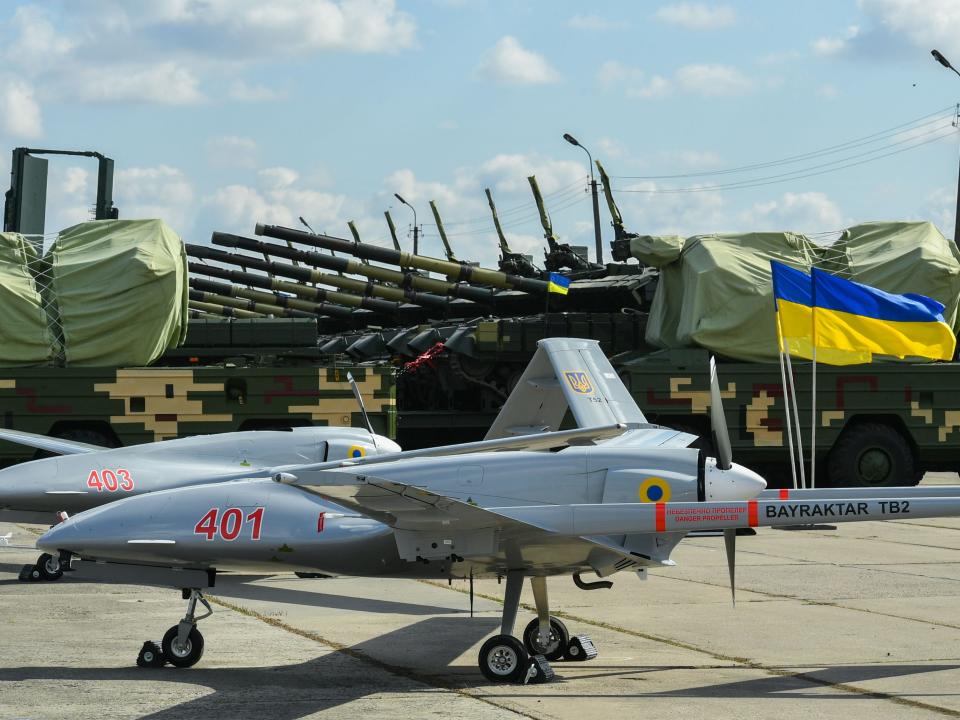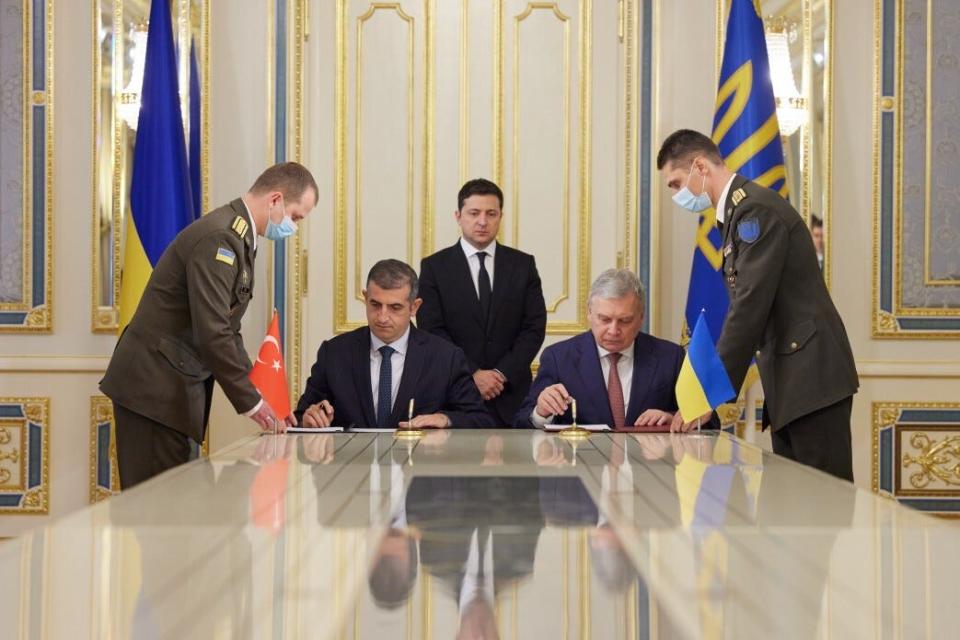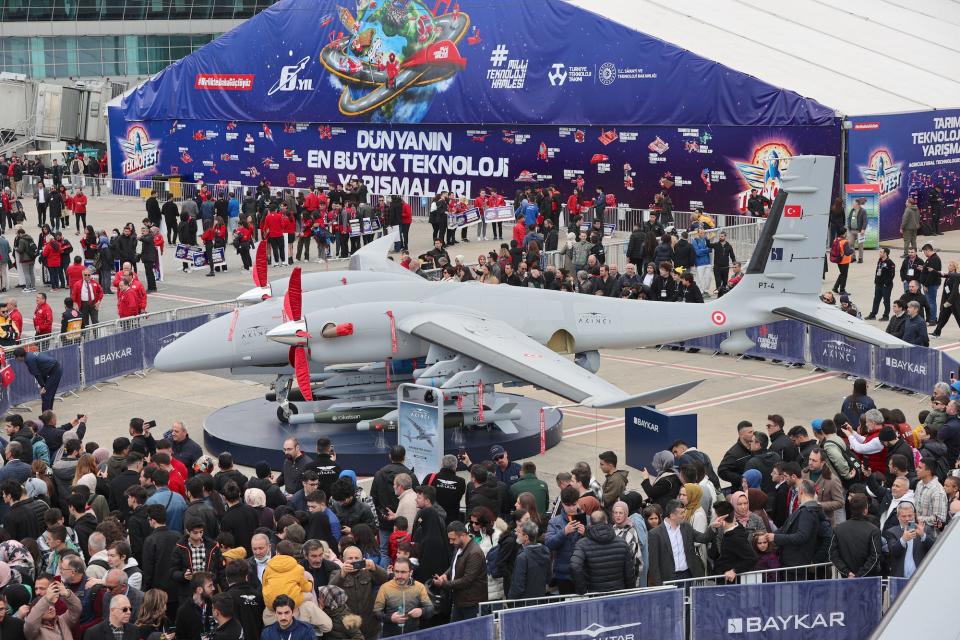Turkey's Bayraktar TB2 drones have lost their edge in Ukraine, but the company behind them is still making a big bet there

Turkish-made Bayraktar TB2 drones were a valuable weapon for Ukraine after Russia invaded last year.
The TB2 drone has lost much of its utility as Russia's military has adapted to its use, however.
But the firm behind the TB2 is investing in Ukraine, and its other drones may see action there.
After months of use by Ukrainian troops, the Turkish-made Bayraktar TB2 drone appears to have lost some utility, in part because of the Russian military's adaptations to it and Ukraine's other drones.
Despite that trend, the drone's manufacturer, Baykar, has announced ambitious plans to construct a plant in Ukraine, a project indicating that despite the TB2's perceived shortcomings, Bayraktar drones still have a future in Ukrainian service.
In October, Baykar CEO Haluk Bayraktar announced that the company would invest $100 million in a drone production facility, service center, and head office in Ukraine, saying that "construction has already begun" and will take "about a year and a half to complete."
The company has grand plans for Ukraine, with one anonymous Baykar official underlining that, for the company's top executives, the country is a "long-term, strategic partner rather than just a market."

Baykar has supplied at least 50 TB2 drones to Ukraine to date. In the weeks after Russia's invasion in February 2022, these drones devastated Russian ground forces advancing toward Kyiv and gave Ukrainian troops a significant morale boost at a critical juncture.
More recently, however, these drones have had a much less significant role — with some conspicuous exceptions — after Russia made adjustments to its air defenses and electronic-warfare systems to counter them more effectively.
"For the TB2, I don't want to use the word useless, but it is hard to find situations where to use them," Col. Volodymyr Valiukh, a commander in Ukraine's Main Intelligence Directorate, said on October 26.
Baykar's future projects in Ukraine do not hinge on the TB2, however. It also reportedly plans on constructing the newer Akinci drone at its plant in Ukraine. With sophisticated sensors and more hardpoints to carry heavier bombs, missiles, and even long-range standoff munitions, the Akinci is an entirely different beast.
Different military systems "are designed for different roles," and the TB2 was more visible during the initial stages of Russia's invasion "because this was when it was needed most," said Ali Bakir, a Turkey expert and non-resident senior fellow at the Atlantic Council's Middle East program.

"Its mission was clear: disrupt Russian supply chains and stall the invasion, giving Ukraine the breathing room to regroup and rally Western military support," Bakir said of the TB2, adding that it "achieved its intended mission efficiently at the time."
As conflict has shifted, so too have Ukraine's "tactical requirements," Bakir told Business Insider. The TB2 isn't as prominent now, but "its efficiency isn't in question" and its "stellar record" over various battlefields since 2020 means "market demand remains robust," Bakir said.
James Rogers, an expert on drones and precision warfare, agreed that the TB2's "strategic utility and military effectiveness" had diminished in Ukraine but said Kyiv sees value in expanded cooperation with Baykar.
Ukrainian troops will still use the TB2 "where possible" and the adoption, and perhaps local production, of the Akinci "will aid Ukraine with its powerful sensors and standoff munitions," added Rogers, who is executive director at the Cornell Brooks School Tech Policy Institute.
"As such, Ukraine and Turkey are likely to remain close long-term, strategic partners," Rogers said.
Bakir said defense collaboration between Kyiv and Ankara, which predates the current war, has been "forged over the years and solidified by recent events."

"Baykar's commitment to invest $100 million in three Ukrainian projects is a testament of the two parties to this enduring partnership," Bakir said.
The Akinci drones are in "a league of their own" compared to the TB2, and equipping Ukraine with them "could be a game-changer if they are smartly employed in a broader defense strategy to amplify Kyiv's military prowess," Bakir added.
Turkey is also eager for the Akinci's combat debut. The TB2's combat successes during conflicts in Syria, Libya, and Nagorno-Karabakh in 2020 and in Ukraine last year won Baykar export orders from a whopping 30 countries. The Akinci's success could help Turkey maintain its edge over other drone producers.
Even if the TB2 isn't as useful in Ukraine now, it doesn't mean Turkey's business with small and medium powers seeking affordable drones will "dry up" any time soon, Rogers said.
"Indeed, where the drone is used by states against weaker non-state actors without air power and air defense (like in Ethiopia), the TB2 will still maintain command of the air, offering nations with traditionally weak air forces a powerful airpower capacity in asymmetric conflicts," Rogers said.
Paul Iddon is a freelance journalist and columnist who writes about Middle East developments, military affairs, politics, and history. His articles have appeared in a variety of publications focused on the region.
Read the original article on Business Insider

 Yahoo Finance
Yahoo Finance 